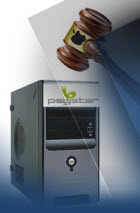Who are the John Does that Apple is looking for?

The motion to amend the complaint against Psystarthat Apple filed the day before Thanksgiving makes for interesting reading because it alleges that there are corporations and/or individuals who have aided Psystar in making the Mac clones possible. But who are these John Does?

18. On information and belief, persons other than Psystar are involved in Psystar’s unlawful and improper activities described in this Amended Complaint. The true names or capacities, whether individual, corporate, or otherwise, of these persons are unknown to Apple. Consequently they are referred to herein as John Does 1 through 10 (collectively the “John Doe Defendants”). On information and belief, the John Doe Defendants are various individuals and/or corporations who have infringed Apple’s intellectual property rights, breached or induced the breach of Apple’s license agreements and violated state and common law unfair competition laws. Apple will seek leave to amend this complaint to show the unknown John Doe Defendants’ true names and capacities when they are ascertained.
So it's clear that Apple is interesting in adding the names of these John Does to the complaint as soon as they are identified. Apple isn't just after Psystar, it's also after people or companies associated with Psystar. This is Apple making an example out of this case in the hope of putting off anyone with the same idea in the future.
But who could these John Does be?
As I see it there are two possibilities:
- Psystar developed the software needed to make the Mac clones work in-house. In this case then Apple might be looking to name individuals connected with Psystar as defendants. Anyone who has a direct link to Psystar should be pretty easy to find.
- That Psystar cobbled together the Mac clones based on information gleaned from Hackintosh projects online. This is more likely, especially since the author of the EFI V8 emulator claimed that Psystar used his/her code for commercial gain without proper acknowledgment (and promptly changed the license to prevent commercial use). It is possible that Psystar corresponded with individuals from the Hackintosh and that now Apple is hoping to find out who these individuals are during the discovery process. In reality these individuals might remain as John Does.
Note: Usually the folks involved in these sorts of projects don't disclose their true identities to others, but it's possible that any correspondences by email or IM might have left a breadcrumb trail that Apple could follow.
Back in the early days when Psystar started selling Mac clones I was contacted by several individuals involved in Hackintosh projects who believed that Psystar's decision to sell Mac clones would be bad for "Mac on a PC" projects because commercial use would attract Apple's attention, and that this could mean legal hassles.
Thoughts?